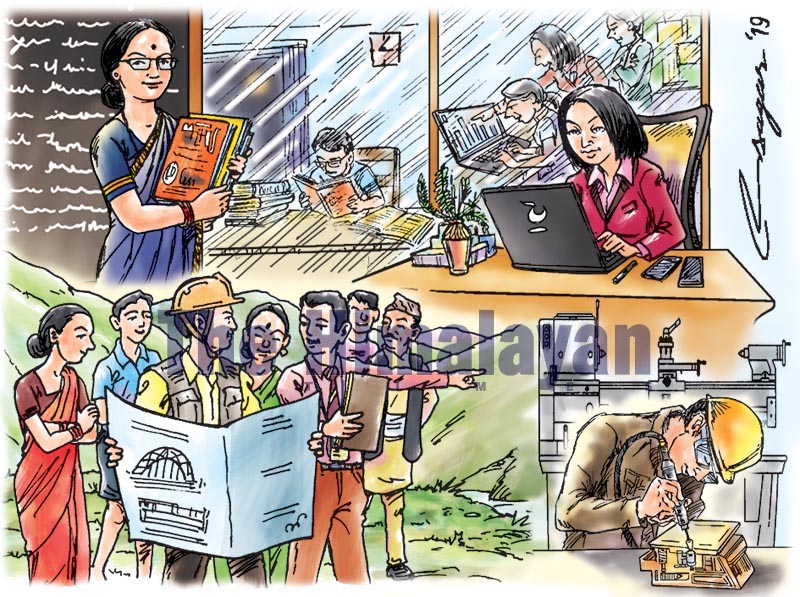Skills-based education: To help solve life’s riddles
Education should not be limited to academic excellence. The real meaning of education is revealed when one is able to cope with future challenges effectively. Therefore, education should focus on teaching the art of living
Education is the key to overall human development. In fact, it is the process of achieving a balanced, healthy state of the human body, mind and soul. Today’s education system should adopt skills-development classes that enable one to be practical and solve the riddles of life in a rational manner. Life-relevant skills help one to think abstractly and approach problems from different angles to come up with practical solutions.
Education should not be limited to academic excellence. The real meaning of education is revealed when one is able to cope with future challenges effectively. Therefore, today’s education system should prepare students on how to live peacefully. In other words, education should focus on teaching the art of living.
Apart from teaching students about the related curricula they should also be taught everyday survival skills. Life is not always a bed of roses, and this is encountered by those intellectuals who always revolve around academic degrees, ignoring the practical things that help to maintain their livelihood.
The education system a country introduces should take care of the needs of the self, family, community and nation as a whole. Education based on knowledge is important, but a skills-based education is more important since it prepares students to face the riddles that the future has planned for them. A life-relevant, skills-based education is a form of education that focuses on cultivating personal life skills, such as self-reflection, critical thinking and problem solving. Therefore, vocational and other skills need to be encouraged. Students must be taught more to focus on how to think, than what to think.
According to Macmillan Education, “In a constantly changing environment, having life skills is an essential part of being able to meet the challenges of everyday life with a solution. Life skills are the abilities for adaptive and positive behaviour that enables humans to deal effectively with the demands and challenges of life.” A skills-based education is useful in many ways.
First and foremost, it provides students with important tools for development, such as independent thinking, ways of socialising and making new friends, and taking action in a situation where the parents or teachers may not be available for help. Life skills are the building blocks that allow students to apply their theoretical knowledge they acquire in school or college to face problems and situations in the real world.
The education system should create awareness among students about the most important skills in life, like ability to focus, communication skills, inspiring others to greatness, mechanical skills and mastering emotions skills. Imbibing such skills makes one conscious, confident, creative, empathetic and able to cope with stress and emotions. One of the key objectives of a life-skills-based education is health education, which makes students aware about good health and safety. In addition to this, it enables students to avoid risky behaviours.
Core life skills as laid down by WHO are: self-awareness, empathy, critical thinking, creative thinking, decision-making, problem-solving, effective communication, interpersonal relationship and adaptability. Mastering these beneficial life-long learning skills through practice helps one work, learn and live better. Life-long learning skills can teach us how to connect with each other and with the world around us. Today’s global market place is highly competitive and challenging, and only a skill-oriented candidate who is creative can compete in such places. An organisation seeks employees who can present the assigned tasks in a pleasing way and ones that will help bring good business.
Moreover, the world is dramatically changing, and people are found entangled in many problems. To face the challenges, problem-solving skills are needed to help tackle anything with a solution. In order to achieve success in any field, mere academic knowledge is not enough. One of the most important skills, that is, critical thinking, plays a significant role. In fact, critical thinking is the ability to think rationally about what to do and what to believe. It may enable one to understand the logical connections between ideas; identify, construct and evaluate arguments; detect inconsistencies and common mistakes in reasoning; solve problems systematically; and reflect on one’s own beliefs and values.
Pedagogy has to be practical; learning can be enhanced through field visits, e-learning, digital or video inputs and so on. And such skills-based education should be taught from the eighth grade. There are numerous examples where a student is compelled to take up a particular field due to parental or peer pressure, and is able to realise his or her passion only at a later stage in life. Introduction to skill training at a young age will by all means give the student an opportunity to explore various options and, accordingly, choose his or her subject of interest.
Even parents can take an active role in teaching life-skills at home with projects that provide real world instances and lessons in decision-making and problem-solving. Building life skills is essentially an exercise in helping children develop sound judgment and good habits for long-term stability, wellness and success.






